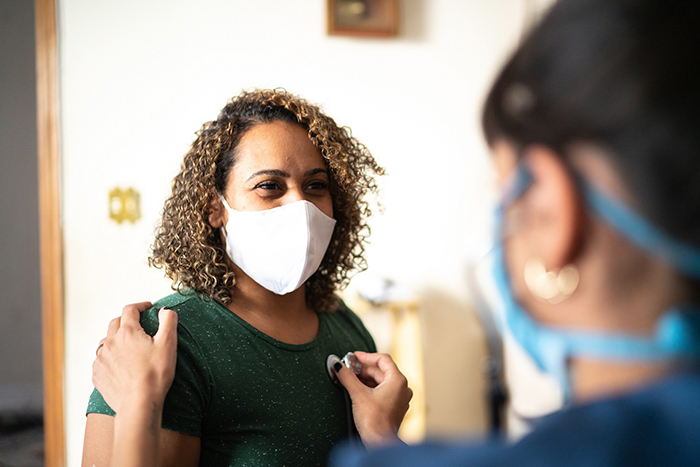A cold or virus can knock you off your feet and keep you in bed for days at a time. Not only do you feel miserable when you’re sick, but you miss out on work, school and with your family. While you can’t avoid sickness altogether, there are a few ways you can stay healthy all year long. Read on to learn five simple tips for combatting illness and keeping you up and at ‘em.
1. Wash Your Hands Properly
Hand hygiene is one of your best defenses against getting sick. That’s why it’s important to follow proper handwashing techniques. The Centers for Disease Control and Prevention (CDC) offer five foolproof steps to make sure you’re washing away germs and bacteria that can make you sick:
- Wet hands with clean, running water.
- Apply soap and lather the backs of hands, between your fingers and under your nails.
- Scrub hands for at least 20 seconds.
- Rinse your hands under clean, running water.
- Dry hands with a clean towel or air-dry them.
Soap and water are always the best way to get rid of the germs on your hands. However, if you don’t have access to running water, an alcohol-based hand sanitizer with at least 60 percent alcohol is recommended.
Be sure you wash your hands after:
- Blowing your nose, coughing or sneezing
- Caring for someone who is sick
- Changing diapers
- Touching an animal, animal food or animal waste
- Treating a cut or wound
- Using the toilet or helping a child go to the bathroom
And before:
- Eating
- Preparing food
- Treating a cut or wound
2. Make Sure You’re Up-to-Date on All Your Vaccines
Vaccines aren’t just for children. The National Foundation for Infectious Diseases recommends that all adults follow the vaccination schedule set by the CDC to help prevent serious illnesses, such as:
- Chickenpox
- Diphtheria
- Hepatitis A
- Hepatitis B
- Human papillomavirus (HPV)
- Influenza (flu)
- Measles
- Meningococcal disease
- Mumps
- Pneumococcal disease
- Rubella
- Shingles
- Tetanus
- Whooping cough
Be sure to talk to your primary care provider to make sure you’re up-to-date on each of these vaccines and to discuss which are right for you.
It’s also important to get vaccinated against COVID-19. You can read the most recent recommendations for children and adults, including who is eligible for booster shots or third doses, and how to schedule yours. Learn more at emoryhealthcare.org/covid.
3. Wipe Down Surfaces
When someone starts coughing or sneezing in your home or workplace, cleaning (to remove dirt and germs) and disinfecting (to kill the germs on surfaces or objects) common areas will help you stay healthy. Be sure to follow the instructions on your cleansers and disinfectants for full effectiveness, and maintain a regular cleaning schedule to keep germs at bay. Target areas that are touched most often, including:
- Computer keyboards
- Countertops
- Desks
- Doorknobs
- Faucets
- Phones
- Remotes
4. Learn Sneezing and Coughing Etiquette
File this under gross, but true: A cough can travel at up to 50 miles per hour and have 3,000 droplets of saliva, which can contain germs, bacteria and viruses. Sneezes have about 40,000 droplets and can travel as fast as 200 miles per hour.
Help stop the spread of germs by following proper sneezing and coughing etiquette: Avoid coughing or sneezing into your hand. Instead, use a tissue to cover your mouth or nose, or use the bend of your arm to completely cover your mouth or nose. Regardless of how you sneeze or cough, be sure to wash your hands frequently if you notice you’ve been coughing or sneezing a lot.
Wearing a mask can also help reduce the risk of spreading germs. Learn more about when the CDC recommends wearing a mask, and when it is required.
5. Schedule Annual Screenings
Annual screenings to check for chronic health conditions, such as high blood pressure, heart disease, diabetes and cancer, are an important part of staying healthy. Scheduling a regular exam with your primary care provider also gives you the opportunity to discuss any health concerns you may have. Find a doctor near you and schedule a well visit today.
Emory Healthcare
At Emory Healthcare, we’re here to help you find the care you need when you need it. With more than 2,800 doctors and 300 locations, including 11 hospitals, primary care offices, urgent cares and MinuteClinics, we’re delivering specialized care across the region. Find a doctor near you to help you get and stay healthy.




